by Catherine Ange
My husband and I met on our high school track team. We dated throughout high school and college and then finally got married two weeks after I graduated. We dated for a total of 6 years before we were married, so that gave us a lot of time to talk about our future. We decided together that we wanted to use a natural means to plan our family and space our children, something lots of people know as Natural Family Planning (NFP). That’s a broad term. We specifically used the Billings Ovulation Method to postpone and achieve pregnancies.
Although we can say that we have always been open to life, in the beginning of our marriage, we were not actively trying to get pregnant. We both desired for me to stay home with our children full time, and we were not in a position at that time to live that lifestyle. So we postponed pregnancy for about a year and a half until my husband got a new job. With this new job came benefits, stability, and security. By this time, we were ready for a new chapter and wanted to welcome a new member to our family.
In the beginning, we were under the assumption that conceiving a baby was going to be easy and relatively quick. I saw a new pregnancy announcement on FaceBook every day! But after a few months with no success, we decided to relearn the Billings Method and pay extra attention to the “achieving” part we may have dismissed the last time. We were accurately practicing the method to achieve a pregnancy for about 6-7 months before we had a confirmed pregnancy! To say we were overjoyed with this new baby and relieved of the stresses that came with our mild infertility is an understatement.
Within a day, I had a complete Pinterest board of everything related to Baby- how to announce it to your family, gender reveal party ideas, birth plans, do’s and don’ts for the delivery room, etc. My husband and I were giddy with joy, but that joy was short lived. About a week later, I started to feel cramping, similar to what I feel on the first day of my period. And then the bleeding started. I knew immediately what it meant, but bloodwork over the course of a few days confirmed I was miscarrying our little baby.
When a woman has a miscarriage, her doctor may recommend that she gives her body three regular cycles to heal and reset before the couple tries again for another baby. So, ultimately we were looking at almost a year of trying by the time that period was up and still no baby to show- we weren’t prepared for that.
But we never talked about this.
My husband and I dated for SIX years before we were married. We talked about everything under the sun, especially children: How many? When do you want to start? How do you want to raise them? Do you have a name list? Etc. But we never talked about this.
My husband and I dated for SIX years before we were married. We talked about everything under the sun, especially children: How many? When do you want to start? How do you want to raise them? Do you have a name list? But we never talked about this. Sure, we might have agreed about adoption if we couldn’t have kids, but that topic was quickly dismissed since we both came from extremely large and fertile families. Surely infertility won’t happen to us? Ha! And here we were. I was completely taken off guard.
We had some all-time lows during this time. Definitely some disappointment in God’s plan for our family. And it didn’t help to learn about everyone else’s pregnancy announcements on social media platforms. I remember being caught between a place of wanting to celebrate their joy with them and simultaneously asking God why it couldn’t be me. It was hard not to be jealous. I did not want to be jealous.
It also didn’t help that I had decided to follow the “suggested” guideline of waiting to announce your pregnancy until you reach your second trimester. You know, since most miscarriages occur in the first trimester, and you won’t have to go back and tell everyone the sad news if it happens to you. It seemed logical at first, but once I was in the middle of that reality, I desperately wished we had celebrated our joyful news with our families when we had the chance so that we could have leaned on them for support to grieve for that little person together. No one knew. No one else in our family knew that little life had existed, even if it was for a moment. No one else knew what we were going through, that we were hurting. And that was compacting the pain. I was grieving the loss of this baby, the chance to celebrate life with the people I loved, and I was beginning to grieve the loss of ever having children of my own.
It took a lot of faith, prayer, and humility to get us to a point of acceptance. We had to accept that God’s plans are not our own, and even if we don’t understand His plan for us, we must have faith in His love for us. We eventually agreed on a “deadline” for when we could start seriously taking action for the adoption process. And that was good for us. We needed a plan for moving forward.
So, we went on, trying to forget that we wanted to be pregnant when we weren’t. But a thought still lingered with us: We were young and healthy and still couldn’t get pregnant for over a year now. Neither of us has any health issues, unhealthy habits, or a family history of infertility. There’s got to be something we’re missing- an explanation for this. Some time after this, a best friend of mine recommended a book, Fertility, Cycles, & Nutrition: Self-care for improved cycles and fertility… naturally! by Dr. Marilyn M. Shannon, so I started reading.
I sat with that book for hours, poring over its wealth of information, but I was most interested in its section about infertility. It was there that I learned about Luteal Phase Deficiency (the luteal phase starts after ovulation and ends right before the next cycle). When reading about this issue, I learned that a woman needs to have a sufficient number of days in her luteal phase in order for her body to recognize that she’s pregnant so that she can sustain it. Some of the symptoms of a Luteal Phase Deficiency include short luteal phases (fewer than 9-12 days), brown spotting at the beginning or end of a cycle, extended mucus patterns, poor mucus quality, and early miscarriage. After learning this and since I had been charting all my cycles for over a year, I looked back at all those charts and noticed some very interesting things.
First, I always had brown spotting at the end of my cycles. I’d thought that was typical. Well, it’s not! At the end of every single cycle was at least one or two days of brown spotting. I also noticed a poor mucus pattern, one that extended with poor mucus quality beyond my alleged “peak” day. And then when I realized that many of my luteal phases were less than twelve days, I knew I had my answer! This was it!! This had to be it! I figured I had a Luteal Phase Deficiency.
I immediately began to read the next section about how to correct it, naturally. It was as simple as making small changes to my diet and taking a vitamin supplement that was high in B6, Vitamin C, and many others my body needed to get on track. So, I ordered the supplements, started taking them right away, and followed the recommended diet to get the proper nutrients to correct the hormone imbalance that was happening within my body. In a matter of 3 normal cycles of making these changes, we conceived a healthy baby! Natural conception, healthy pregnancy, uncomplicated labor and delivery, and a beautiful, healthy, thriving baby girl. We could ask for nothing more.
We conceived a healthy baby!
In a matter of 3 normal cycles of making these changes, we conceived a healthy baby! Natural conception, healthy pregnancy, uncomplicated labor and delivery, and a beautiful, healthy, thriving baby girl. We could ask for nothing more.

I thank God for the gift of natural family planning and for the doctors and scientists who teach the methods and research the issues behind infertility. Without the insight of Dr. Shannon’s book or the ability to analyze my own fertility data by use of my personal charts, who knows what my journey to motherhood would have looked like, or how long it would have taken?
As I write this today, my daughter is 17-months old and I recently became pregnant again. This journey has already been very different from our past experience since I conceived this new baby in our first month of trying. Honestly, given our past experiences with difficulty in this area, I did not believe we would succeed so quickly. But this time, I made it to 8 weeks, and I was able to see my doctor for an ultrasound. I thanked the Lord for the tiny heartbeat we saw blinking on the screen. But a week later, the night before Mother’s Day, I saw brown spotting. My heart sank, and I prayed, Please. Not on Mother’s Day. Not on the day we were planning on telling our families. Please have mercy on me. I can’t do this again.
My husband and I had made plans to announce the pregnancy to both our families at our Mother’s Day gatherings. By this time, we had a sonogram and it was the first time our families will be gathered together in a long time (courtesy of COVID-19). It was the perfect time, and we had been looking forward to it for almost a month. But now this. I didn’t want it to ruin our plans for celebration though. I remembered too well how I felt the first time, without our parents or siblings knowing. So I told my husband, “If I wake up tomorrow, and I’m not bleeding, I want to tell everyone as we had planned. If I’m spotting, fine, but I want the chance to tell everyone while I’m still pregnant. I want to celebrate.” Because for all we knew, this might have been another weird side effect from the progesterone I had been taking. For right now, I was still pregnant and maybe everything was going to be fine.
So we went on with our plans that Mother’s Day. The spotting continued, but it never got worse. Physically, I felt fine; but I couldn’t deny that I was emotionally concerned for my baby’s life. But celebrating was everything I wanted it to be. The cheers, the hugs, the laughter. It was what I needed. I wanted the people I loved to know about this little baby and to be happy with me. We disclosed to everyone that I was experiencing some spotting, and I asked for their prayers. This was so good. Especially for what came to happen three days later.
On Wednesday afternoon, I was vaguely aware of some abdominal discomfort resembling light menstrual cramps, but it was lunch time and my 16-month old was keeping me too busy to completely notice what was going on. It wasn’t until I went to the bathroom an hour later when I realized that things had gone from concerning to grim. There was no denying the bright red color that was spelling out the loss of my second baby.
I found my husband working on a home renovation project in the back of the house, and I couldn’t even speak to get his attention. He eventually looked in my direction and immediately knew what had happened by the look on my face. He embraced me while we wept together.
My doctor’s office was able to fit me into their schedule the following morning for an ultrasound. I wanted to hold onto hope, but in my heart, I already knew what he was going to say. Examining the monitor and then reviewing my previous appointment’s sonogram, he remarked in a tender voice, “Yeah, Catherine, this looks concerning. I’m so sorry, but it looks like a miscarriage.”
We had called our moms to relay the news and to ask them to notify the rest of our families, and I sent messages to my closest friends who knew about the baby. We received messages of support and love, and I could feel the community as we all grieved together. Friends offered to bring us dinner and family offered to keep our toddler. Prayers flooded in, and I could feel the effects of their grace. It was the support I needed and wished I’d had the first time.
When I reflect on the experiences of both my miscarriages, I am struck by the difference in how I coped with the grief. In my first miscarriage, I felt a dark void, a total emptiness with no hope. I remember wondering to myself if I was ever going to have a child of my own; if I was ever going to be a mother, something I’ve always wanted. Losing a child was one thing, but losing hope for a child is a whole other thing completely.
My second miscarriage was a completely different story. I absolutely grieved for my baby, but I coped with the grief in a different way. I remember coming home from the doctor’s office to confirm the miscarriage, and wanting to curl up in a ball on the couch (it was raining and dark outside, totally cliché but appropriate for my state of mind). I didn’t want to move because moving meant thinking and thinking meant feeling, and feeling was something I thought I couldn’t handle. But like any 16-month old, mine doesn’t understand personal space and couldn’t comprehend our current circumstances, so she ended up on the couch right next to me. At one point while I was crying, she straddled my body and grabbed my face into her hands and began to talk to me with words I couldn’t understand. But her intent and adorable chuckle at the end of her monologue assured me that everything was going to be alright. How could I keep from smiling when I looked at her and listened to her babbles? The emptiness I’d felt the first time wasn’t there this time because my daughter was here to fill it. She was my reminder to stay hopeful for the future. That it was ok to grieve and to feel lost, but to never be hopeless or despairing because we can never know what is to come. She was my rainbow baby giving me some light to hold onto for our next baby.
She was my reminder to stay hopeful for the future.
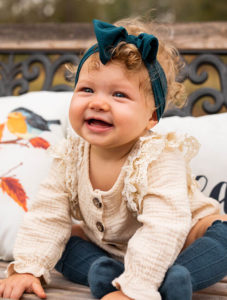
The opportunity to speak about our situation with friends and family liberated us from the feeling of isolation and silent suffering. To know they were praying, to know that I didn’t have to pretend that everything was ok when it wasn’t, was a huge consolation in the midst of our pain. And knowing what I know now, I have the hope to see myself through this. I miss the baby I carried not so long ago, and I will cry that day in December when I was expecting the chance to hold him, but I trust the plans the Lord has for my family, and I have every reason to hold onto hope for the future.
Q & A with Allison, Founder Miscarriage Hope Desk
How many miscarriages & how many live births?
2 miscarriages, 1 live birth. I was 24 when I conceived my daughter naturally, 23 and 26 for my miscarriages.
Looking back, what, if anything, do you wish you would have done differently?
In my first miscarriage experience, I wish I would have told my family and friends sooner about my being pregnant. Regardless of the fact that I lost the baby, I would have loved to have shared the happy news when we had it and then to have leaned on their support when we needed it.
What were you told was the cause of your miscarriages?
I was told that miscarriages are common and occur in about 15% of pregnancies, so despite the fact that it was tragic, it was a usual occurrence for women everywhere and shouldn’t affect my ability to get pregnant in the future. My husband and I hadn’t been trying “long enough” for my doctor to show any concern for infertility yet, so we hadn’t seen a specialist to determine the reason behind our initial difficulty.
What do you truly believe was the cause of your miscarriages?
I truly believe I had/have a Luteal Phase Deficiency. Once I took measures to correct it, we were able to conceive. It took a healthier diet and an increase in certain vitamins and nutrients to get me on track.
What advice would you give to someone going through recurrent miscarriage?
Don’t give up hope; seek help from professionals who can give you actual answers and solutions. There are people who dedicate their entire professions to helping women who are struggling with infertility and miscarriages. There is specific health science focused on the ability to work with the woman’s natural cycle, known as NaProTECHNOLOGY (Natural Procreative Technology). So many doctors avoid the opportunity to discover why you’re not getting pregnant and go straight to how they can help you get pregnant, i.e. IVF, which is extremely costly and not always guaranteed to work. NaPro doctors help the woman figure out what exactly is going wrong, determine how they can help her correct it, and then aid her in fixing the problem so she can conceive a baby naturally. They dive down a lot deeper by finding the underlying issue that’s keeping her from conceiving on her own, and then figuring out a solution to the problem. Here is a link to a site that can help women learn about NaPro technology and direct them to a doctor in their area who can help them. This is where my husband and I would have gone if we had never been successful on our own. Link: https://www.fertilitycare.org/
Secondly, I want to add that the support of your community is paramount in regards to true grieving and healing. Don’t keep quiet about this. If you can, share your pregnancy news with family or friends you trust and ask them to pray for you and your baby. Connect with other women, listen to their stories, SHARE your story. Don’t stay quiet about it. There is comfort in community and learning that you are not suffering alone.

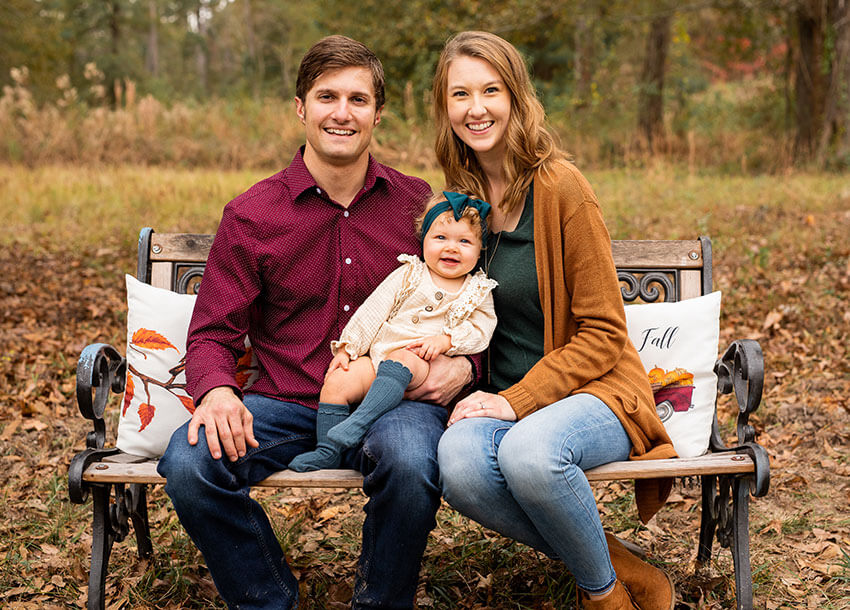
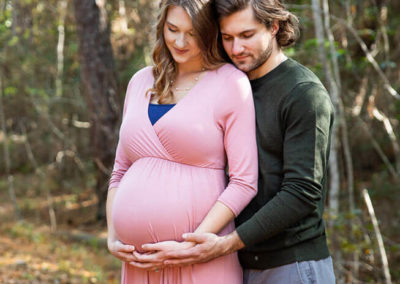




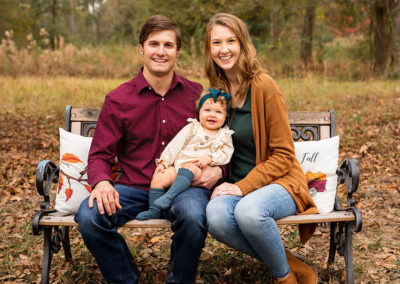
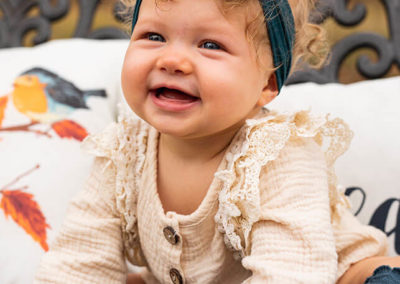

0 Comments